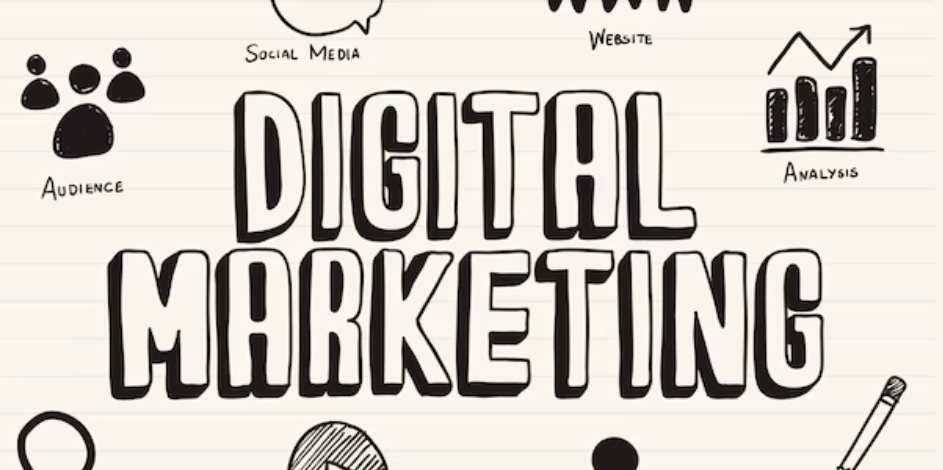Even if you aren’t aiming to change industries and become a marketing expert, this skill set is essential for small company owners and other people working to attract and convert clients. Digital marketing has experienced significant development as a professional path in marketing, with no signs of slowing down. Continue reading to find out why and how to begin your journey of learning about digital marketing.
What are the benefits of Digital Marketing for businesses?
Internet shoppers will typically choose the company that offers the finest customer experience when they are doing comparison shopping. Simple details like contact information, operating hours, and location should be simple to find. Customers will shop elsewhere if they don’t feel that your online store is open when they want to and according to their terms.
Online marketing, however, is much more than a defensive move. It goes beyond simply keeping potential customers away from rival businesses. Instead, consider it a proactive strategy that demonstrates to clients that a company has given consideration to them and their buying process. Making that process as simple as possible is the first step in a successful digital marketing plan, especially for firms that are not primarily concerned with e-commerce.

Is Conventional Marketing displaced by Digital Marketing?
Adopting digital marketing does not require you to stop using your current traditional marketing strategies. Utilize digital marketing instead to expand on conventional campaigns. Videos, pictures, and music from digital media sources might provide context, nuance, or clarity to advertising claims you’ve already made.
What advantages can Digital Marketing offer?
Compared to conventional advertising strategies like billboards, TV, radio, print ads, and direct mail, digital marketing has several advantages. It enables businesses to make better use of their resources while enabling consumers to interact with brands on their terms.

Online marketing, at the very least, enables clients to locate the information they require even after you have closed for the day. Instead of requiring users to call during office hours, it provides them the opportunity to email queries at any time. This places your interactions on their schedule and not the other way around.
When done correctly, digital marketing is the best approach to establish authority and brand recognition in the Internet, the world’s largest market. Through social media, brands can interact directly with their target audience to find out exactly what they want and to build real connections that inspire trust and brand loyalty.

In other words, the value of digital marketing goes beyond generating revenue; it is an ongoing investment in the survival and expansion of your company. The following are some advantages of including digital methods in your marketing strategy:
- Reach
Digital advertising is a cost-effective option for small businesses concerned about ad spend. Unlike traditional advertising methods that rely on specific media formats that are progressively going out of style, digital marketing can connect with anyone, anywhere, even on a global level. Most prospective customers use mobile devices and spend a significant portion of their day online, making it easy to reach them where they are. - Targeting
Digital marketing tools and analytics enable brands to target and identify the consumers most likely to be interested in their products or services. With a solid digital marketing plan, businesses can make better use of their resources, both financial and human. - Adaptability
Modern marketing analytics solutions offer real-time insights that enable companies to quickly modify their marketing strategies. Even if a digital campaign is unsuccessful, the money that was spent on it can still be recovered. - Measurement
Digital marketing channels are pre-equipped with the performance-tracking tools that firms need. It is easy to check how many impressions, clicks, and likes social media postings are receiving, as well as how many people are visiting your website and where they are coming from. - Reputation
Businesses with a strong online presence are more likely to gain potential clients’ trust. A website, testimonials, and a social media profile demonstrate a brand’s credibility and experience. Trust may make or break a transaction for consumers evaluating a new product or service. - Liberalization
When done correctly, digital marketing may give small businesses the same opportunity to compete with large organizations. Despite having the largest budgets, big box stores cannot buy significance in search engines. Only through demonstrating relevance through tactics like pay-per-click (PPC) advertising and search engine optimization (SEO) will a website be able to rise to the top of the Google results page.

- Cost-effectiveness
Digital marketing is a cost-effective option for small businesses that may not have the budget for traditional advertising methods like TV commercials, billboards, or print ads. Digital marketing channels like social media, email marketing, and content marketing can be more affordable and offer a higher return on investment. - Engagement
Digital marketing allows businesses to engage with their customers in real-time. Social media platforms provide an opportunity to connect with customers, answer their questions, and respond to feedback. This engagement can help build relationships with customers and increase brand loyalty. - Personalization
Digital marketing allows businesses to personalize their marketing messages and offers to individual customers. By using customer data and behavior tracking, businesses can create targeted ads, email campaigns, and content that is more likely to resonate with their audience. - Competitive Advantage
Digital marketing can give small businesses a competitive advantage in their industry. By creating a strong online presence, businesses can differentiate themselves from competitors and position themselves as leaders in their field. - Flexibility
Digital marketing offers businesses the flexibility to experiment with different strategies and tactics. By testing and analyzing different campaigns, businesses can refine their approach and improve their results over time.
Digital marketing is an ongoing investment in the survival and expansion of a company. While traditional marketing strategies are still effective, digital marketing expands on them, providing businesses with greater reach, targeting, adaptability, measurement, reputation, and liberalization. As a digital marketing specialist, I recommend small business owners start their journey of learning about digital marketing to give their business a competitive edge in today’s market.
Digital marketing offers numerous benefits for small businesses. From cost-effectiveness to engagement and personalization, digital marketing provides opportunities for businesses to grow and succeed in today’s digital landscape. As a digital marketing specialist, I recommend that small business owners invest in digital marketing to stay competitive and reach their target audience effectively.







 Content Writing
Content Writing Video Marketing
Video Marketing Graphic Design
Graphic Design Lead Magnet Creation
Lead Magnet Creation Content Marketing
Content Marketing